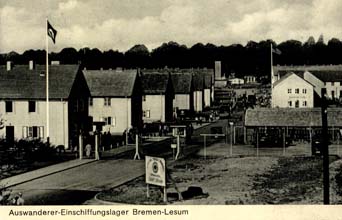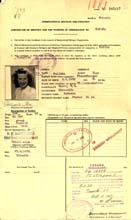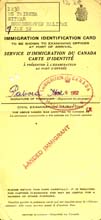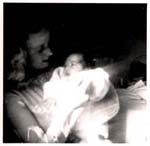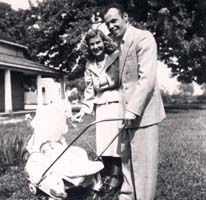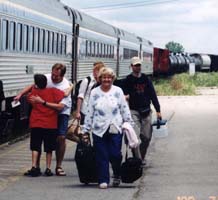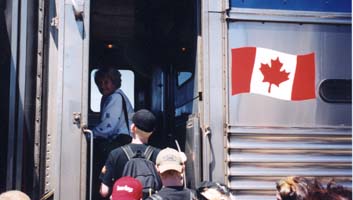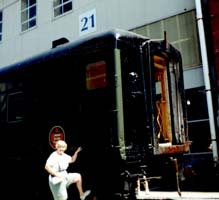Sobey Wall of Honour
Column
49
Row
13
We had only one room to live in, in Villach Austria. Our two houses were destroyed by bombs and my husband was an Italian refugee from Communist Yugoslavia. We decided to apply in Tireste, Italy (free territory) for our immigration to Canada. I was pregnant. There was no hope for us to get a place to live in Trieste or Austria, so sometime in early November 1951 we went on an immigration train to Lesum, Bremerhaven Germany (refugee camp).
My husband boarded the Fairsea right away and arrived in Halifax Pier 21 on December 4, 1951. I was not allowed to go to Canada with my husband because I was seven and one half months pregnant.
I was placed in a camp at Blankensee near Lubeck Germany. I remember the long line-ups for meals and the corn husk mattresses that I slept on and the long walks to the refugee offices to see how long it would be before I could go to Canada. I didn't want to have my baby in the camp. When I returned to the gate I could not walk any longer and two Polish guards carried me into the camp. I also remember being bitten up by bed bugs. I was at the camp for Christmas 1951 and celebrated an American style Christmas that year. Finally, I was shipped to Bremerhaven on December 27, 1951. I was put on the train on the very last passenger car. It was a very rough ride for me.
I embarked December 28, 1952 onto the Fairsea ship. When walking up the gangplank of this ship I saw very small snowflakes falling and I repeated "In God's Name I go." The crew put me in a room with many people and I saw only hammocks to sleep on. A young sailor (Italian crew) said to one of his superiors. This woman cannot be sleeping on a hammock so they put me in another room where there was a bed. Our toilet was a chamber pot. The sea was very rough. It was so frightening. A little woman put life preserver cushions around me.
I was in the eating area twice only. I remember long tables with cornflake boxes on them picture of a big rooster on the boxes wondering what that was. I nibbled on a few cornflakes but wasn't hungry anyway. I recall seeing tall men with black suits and big hats on. I took so sick I was put in the hospital part of the ship. I didn't eat or drink anything because nothing would stay down. Because of the rough water the chamber pots were rolling all around the room and I could not find one so I will leave it to your imagination to know how I managed.
All I heard was noises with the ship hitting the waters so hard because of the wild storm on the sea. Every minute I thought the ship would break in half. Then I heard voices yelling "I see land, I see land" meaning that we had finally made it. The ship's doctor came to see me telling me everything is made ready for me in case I had my baby on the ship. If the baby had been born on the ship it would have been a Panama citizen.
I arrived in Halifax Harbour on January 8, 1952, four days later than scheduled because of the rough sea. I saw some officials come up the gangplank and pin a medal on our captain's chest. (the Captain was directly in front of me). I now know the reason for the medal was probably because he had taken our ship away from a possible tornado/hurricane thus the four extra days at sea. The ship's doctor wanted to place me in the hospital but I did not know that Pier 21 had a hospital so I refused to go saying that I would just go on the train. The doctor took my hand and guided me onto the train and said that he would clear up my immigration papers. He returned with an immigration officer and gave me my papers stamped Immigration Canada, landed Immigrant. The doctor said that a German nurse is going to be on the train going to Toronto. The train was waiting for many hours to process over 2000 immigration papers. I remember the seats were so hard that I was sliding from one side to the other. Everything was so depressing. Many tears were shed. I cried silently for my mother and father. Childhood memories flooded my mind of days with my school friends and little brother but I was alive and my baby will be born in Canada.
It was now breaking morning I looked out the train but all I could see was bushes and bushes and no houses. I questioned. Is this Canada? I was told when I left Austria that Canada was native Indians so I looked for tents and teepees believe it or not. I didn't see any, just bushes. We reached Montreal and I saw houses and it made me feel better.
We came to Trenton Ontario where my husband would be waiting for me. I arrived there on January 11, 1952. On February 25, 1952 my little girl was born. She had two teeth and the doctor removed them. I didn't know why my baby was not brought to me for two days after her birth. I thought that she was dead. After three months we moved to Belleville Ontario. Because we lived beside the airport in Trenton and the planes had maneuvers around 11:30 each night and I could only remember bombs in my country being dropped. It bothered my nerves so much that we had to move.
This is my story of my journey to Canada.
